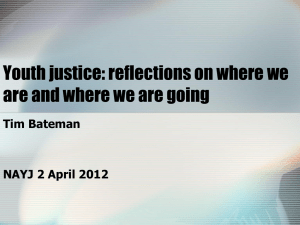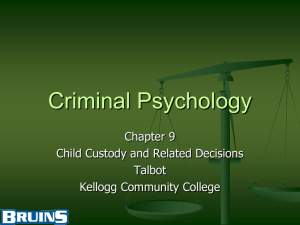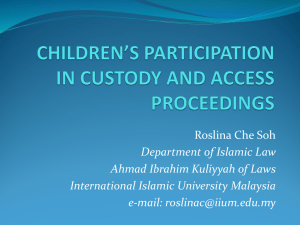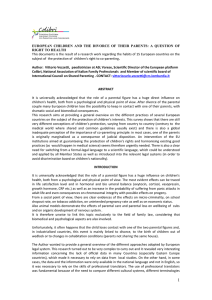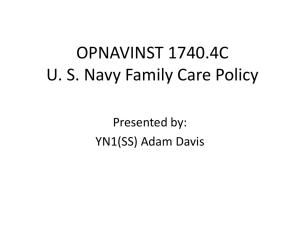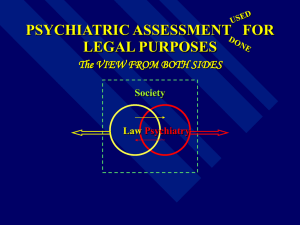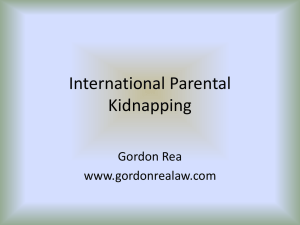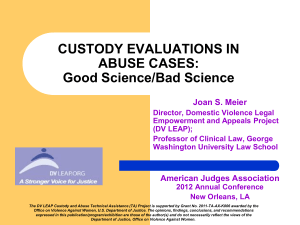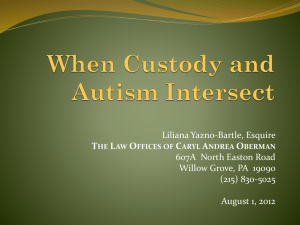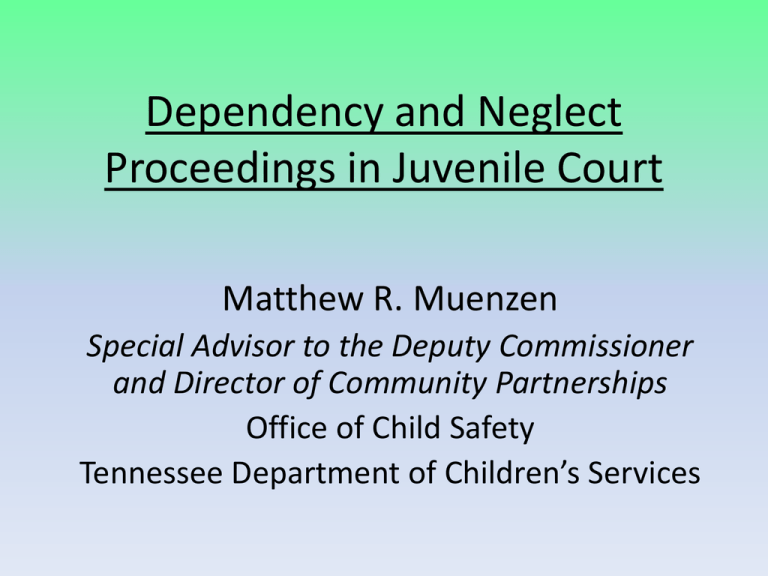
Dependency and Neglect
Proceedings in Juvenile Court
Matthew R. Muenzen
Special Advisor to the Deputy Commissioner
and Director of Community Partnerships
Office of Child Safety
Tennessee Department of Children’s Services
Abuse and Neglect Referrals
Who must make a child abuse/neglect referral?
• §37-1-403(a)(1)
– Any person who has knowledge of or is called upon to render aid to
any child who is suffering from or has sustained any wound, injury,
disability, or physical or mental condition shall report such harm
immediately if the harm is of such a nature as to reasonably indicate
that it has been caused by brutality, abuse or neglect or that, on the
basis of available information, reasonably appears to have been
caused by brutality, abuse or neglect.
• §37-1-409(a)(1)
– Reports of harm and the identity of the reporter are confidential,
except when the juvenile court, in its discretion, determines the
testimony of the person reporting to be material to an indictment or
conviction
Abuse and Neglect Referrals
• §37-1-409(a)(2)
– The name of any person reporting child abuse shall not be
released to any person, other than employees of the
department or other child protection team members
responsible for child protective services, the abuse registry, or
the appropriate district attorney general, without the written
consent of the person reporting.
– Such person's identity shall be irrelevant to any civil proceeding
and shall, therefore, not be subject to disclosure by order of any
court.
• DCS Child Abuse and Neglect Hotline
– (877) 237-0004
– https://reportabuse.state.tn.us
• Contains examples of priority assignments
Physical Abuse Referrals
• Any child under the age of 18
• Alleged perpetrator:
– Parent, caretaker, relative, other person living in
home
– Educator, volunteer or employee of an
educational/recreational/ organizational setting
who is responsible for the alleged victim
– Any individual providing treatment, care, or
supervision for the alleged victim
Sex Abuse Referrals
• Under 13 – any sexual abuse
• 13 to 18 – only sex abuse when alleged
perpetrator is:
– Parent, caretaker, relative, other person living in
home
– Educator, volunteer or employee of an
educational/recreational/ organizational setting
who is responsible for the alleged victim
– Any individual providing treatment, care, or
supervision for the alleged victim
Allegations of Harm
• Physical Abuse and Drug Exposed Infant/Child
• Environmental Neglect, Nutritional Neglect,
Medical Neglect, Educational Neglect, Lack of
Supervision, Abandonment
• Child Sexual Abuse
• Psychological Harm
• Child Fatality/Near Fatality
Assessing Risk of Harm
•
•
•
•
•
History of Abuse and Neglect Factors
Child Factors
Parent/Caretaker Factors
Environmental Factors
Service Provision Factors
After the Referral
• After investigation or assessment begins:
– Open DCS Case with services
– Non-Custodial Placement
– Remove into DCS Custody
Indication (Substantiated)
• As of January 1, 2014, cases will be classified
as “substantiated” instead of “indicated.”
Also, cases will be classified as
“unsubstantiated” instead of “unfounded.”
Immediate Protection Agreements
•
•
•
•
•
•
•
Having the child stay with relatives or friends
Suspending or restricting visitation
Having the alleged perpetrator leave the home
Walk-through of placement home
Drug tests for safety placement if drug-related case
DCS and Criminal background checks
Physical custody to safety placement, legal custody
remains with parents, unless DCS requests legal
custody transferred to safety placement
• Must have a custodial parent to sign the IPA
Immediate Protection Agreements
• Restraining orders
– Detrimental/harmful to child
– Usually when there is a good parent and a bad parent
•
•
•
•
Legal must approve IPA
Petition filed with Juvenile Court
No out of state placement
Must include risks and tasks to overcome the
risks
• Cannot terminate parental rights because no
legal custody
Custodial Removals
• Reasonable grounds to remove
– Must prove:
• Least drastic alternative
• Reasonable efforts were made to avoid removal
– Or reasonable efforts not necessary
• Best interests of child
• Legal must approve removal
• Exigent Circumstances
Custodial Removals
• 48 hours after removal to file petition
• 72 hours after removal to have preliminary
hearing
– Probable Cause that child is dependent and neglected
– Placement is decision of DCS, not Court
– Can still place child with family under kinship care
program
– ICPC
– Court must approve by clear and convincing evidence
that it is safe for child to return home
– DCS seeks child support while children in custody
DCS Custody Cases
• Other Ways a Child Can be in DCS Custody
– Dependent and Neglected
• Private Party Petition
• Guardian ad Litem Petition
• Court Order
– Unruly
– Delinquent
Permanency Plans
• Permanency plan is document that explains what
parents need to do to get their child back
• Plan within 30 days, ratification within 60 days, expire
in 6 months or 12 months
• Services, Needs, Visitation
• Goals/Dispositions for children in custody
–
–
–
–
–
Return to parent
Exit custody to relative
Adoption
Permanent guardianship
Permanent Planned Living arrangement (stay in foster care
until 18)
DCS and Juvenile Court
• Court Hearings in General
– Due Process requires GAL, attorneys for parents, and
preliminary hearing
– Children 13 and older must testify unless unavailable
– Exclusive Original Jurisdiction after petition filed
• ALL other court orders i.e. visitation, custody are
SUSPENDED during DCS case
– Preliminary/Adjudication/Disposition/Review
– Reliable Hearsay allowed at preliminary/dispositional
hearings
– Rules of Evidence §803(25) – statements made by
child about child abuse are not hearsay
Permanency Planning Hearings
• Permanency Hearings
– Plan Ratification
• Every 6 months or 12 months, depending on length of plan,
can be extended
• New ratification if new goal established
• Reasonable Efforts
• CASA Report
• Foster Care Review Board
– Held every 6 months
– Hotsheets
– Extension of Foster Care Services
Discovery
• Rule of Juvenile Procedure – Informal
Discovery
– TPR – Rules of Civil Procedure
• Subpoenas
– Subpoenas Duces Tecum
• Depositions
• Interrogatories
• Records
Adjudications
•
•
•
•
•
Trials
Removal – 30 days from entering custody
IPA – 30 days from filing petition
Clear and convincing evidence
§37-1-102(b)(12)
– Dependent and Neglected
• §37-1-102(b)(23)
– Severe Abuse
• Findings of Fact/Conclusions of Law
Dispositions
• Occurs right after finding of dependency and neglect
is made unless bifurcated
• “Sentences” if it were Criminal Court
• Settlements
• Preponderance of the Evidence – BEST INTERESTS OF
THE CHILD
• Final Order
• Appeals to Judge, Circuit Court, Court of Appeals,
and Supreme Court
Review Hearings
• Check on status of services and reasonable
efforts
• Varies from Court to Court
• Check on the status of the case
• Post-dispositional review hearings
• Optional
Caretakers of Children in Tennessee
•
•
•
•
Legal Parent
Permanent Guardian
Temporary Custodian
Power of Attorney
Power of Attorney
• §34-6-302
– Temporary for hardships including, but not limited to:
• Serious illness or incarceration of parent/guardian
• Physical/mental condition of parent/guardian/child is such
that care and supervision of the child cannot be provided
– School not required to enroll a student with a power
of attorney stating other hardships
• §34-6-303
– One parent with legal custody – only one to sign
– Two parents, other parent must consent
– If consent unavailable, must write why in document
Power of Attorney
• §34-6-304
– May authorize to perform:
•
•
•
•
Enroll the child in school and extracurricular activities
Obtain medical, dental and mental health treatment for the child
Provide for the child's food, lodging, housing, recreation and travel
Any additional powers to caregiver
• §34-6-305
– If parent/guardian disagrees with the decision of the caregiver
or chooses to make any healthcare or educational decisions for
child, the parent must:
• Revoke the power of attorney
• Provide the health care provider and local education agency either:
– Written documentation of the revocation
– Court order
Power of Attorney
• §34-6-308
– No school liability for honoring power of attorney
Custody
Physical Custody
• Who has a child the majority of the time
• Legal authority to make major decisions for
the child is very limited
Custody
Legal Custody
• Who has the right to make important decisions regarding a child
– Education, Health, Religion
• Responsibility to provide:
– Food, Clothing, Education, Housing, Care
• Parents are financially responsible for child
• §37-1-140
– Temporary Legal Custody from Juvenile Court
• Same as sole legal custody
• Lasts until someone challenges it in court
– Until parent/guardian reasonably remedies conditions
• Significant changes
• Best interests of the child
– Any person with a close/significant relationship
Custody
Custody Rights Between Unmarried Persons
• No court order identifying a father:
– Mother automatically has physical and legal custody
– Alleged father has no custody/visitation rights
• Father can get a court order establishing parentage if:
– DNA test
– Signed acknowledgement of paternity
• Court order must be signed by a judge
• Alleged father can still get custody rights even if not
listed on birth certificate
Custody
• Either parent can file petition to establish
parentage
– Once petition is filed, court will:
• Order DNA test
• Accept voluntary acknowledgement of paternity
– Even if court declares a man as the father, can still
order:
• Supervised visitation
• No visitation
Custody
• Court has option of:
– Giving both legal and physical custody to one
parent
– Giving joint legal and joint physical custody to
both parents
– Giving legal custody to one parent
• Once child is legitimated, court can order child
support
Custody
Custody Rights Between Married Persons
• Both parents have equal rights and access to children if there is no custody
order
• Whoever has physical possessions of child has custody until there is a
court order
• Custody can be legally determined:
– In a divorce action
– In a dependency/neglect action
– In an order of protection case
• Court has option of:
– Giving both legal and physical custody to one parent (shared parenting)
– Giving joint legal and joint physical custody to both parents (shared parenting)
• Giving legal custody to one parent and physical custody to the other
parent
Guardianship
• All rights of legal custodian
• Permanent caretaking responsibilities for child without TPR
• Duty and responsibility to make important decisions in
matters having a permanent effect on the life and
development of the child
• Not responsible of child’s expenses
• Child not able to be legally taken away without consent
• Until substantial change of material circumstances AND
best interests of child
• Right to receive public benefits on behalf of the child
• Same rights as parents
Guardianship
• §37-1-802
– Child has been previously adjudicated d/n, unruly, or
delinquent
– Child has been living with proposed guardian for at least 6
months
– Best interests of the child
– Reunification is not in best interests of the child
• §37-1-803
– Does not end parental rights to:
•
•
•
•
Inherit from parents
Visit or contact
Consent to adoption
Provide financial, medical, or other support to child
Guardianship
• §37-1-804
– Rights and Responsibilities:
• Protect, nurture, discipline, and educate the child
• Provide the child with food, clothing, shelter, education, and
health care
• Authorize release of information that would require consent
of parent
• Consent to social, school activities, military enlistment, and
marriage
• Obtain legal representation for the child in legal actions
• Decide who the child can socialize with and when and where
the child can travel
Termination of Parental Rights
Alternatives to TPR
•
•
•
•
Subsidized Permanent Guardianship
Voluntary Surrender
Waiver of Interest
Effects of Alternatives to TPR
Termination of Parental Rights
Parties to Termination
• Alleged Father/Legal Father
– Birth Certificate/Voluntary Acknowledgement of
Paternity
– Married
– Court Order
• Petitioners
Termination of Parental Rights
Statutory Grounds
•
•
•
•
•
Abandonment - Failure to Visit
Abandonment - Failure to Support
Abandonment - Failure to Provide a Suitable Home
Abandonment by Incarcerated Parent – Wanton Disregard
Abandonment by Incarcerated Parent – Failure to
Visit/Support
• Abandoned Newborn
• Substantial Non-Compliance With Permanency Plan
• Persistence of Conditions
Termination of Parental Rights
• Severe Child Abuse of Child/Sibling
• Severe Child Abuse Conviction With Sentence of 2
or More Years
• 10 Year Prison Sentence if Child Under 8
• Intentional/Wrongful Death of Other Parent
• Mental Incompetence
• Failure to Legitimate
• Aggravated Rape From Which Child Conceived
• Convicted of Trafficking for Commercial Sex Act
and Child was Victim
Termination of Parental Rights
Best Interests of Child
•
•
•
•
•
•
•
•
•
Adjustment of Circumstances
Lasting Adjustment after Reasonable Efforts
Regular Visitation
Meaningful Relationship
Change of Custody Effect
Abuse by Parent
Safe Home
Mental Stability
Child Support
Termination of Parental Rights
Reasonable Efforts
• Specific Grounds
• Relief from Making Reasonable Efforts
Termination of Parental Rights
DCS Required to File TPR Petition
•
•
•
•
•
Foster care 15/22 months
Abandoned Infant
Murder/Manslaughter of Child/Sibling
Severe Abuse of Child/Sibling
Unless:
– Relative
– Compelling reason documented in permanency plan
– DCS has not made reasonable efforts
Termination of Parental Rights
Appeals
•
•
•
•
Court of Appeals/Supreme Court
Final Order/30 Days
File Transcript/45 Days
Appellant Brief/30 Days After Record Filed and
Appellee Brief/20 Days
• Oral Argument/1-4 Months after Briefs
• Ruling/3 Months
• Permission to Appeal to Supreme Court/60 Days
Matthew R. Muenzen
• Desk Phone
– 615-741-3411
• Cell Phone
– 615-210-5366
• Email
– Matthew.Muenzen@tn.gov
• Twitter
– @mattmuenzen


